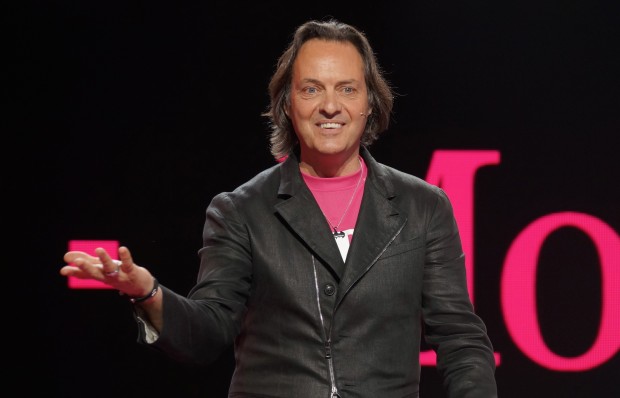
After years of on-again, off-again talks, wireless rivals T-Mobile and Sprint plan to merge in a deal that values the combined company at $146 billion, aiming to create a much stronger competitor to AT&T and Verizon, the giants of the U.S. wireless industry.
The combined company will be named T-Mobile, with current T-Mobile CEO John Legere at the helm. The “New T-Mobile,” as it’s called in a news release, will have its headquarters in Bellevue, Wash., where T-Mobile is based, along with a “second headquarters” in Sprint’s home of Overland Park, Kan.
On a conference call with Sprint CEO Marcelo Claure this morning, Legere told reporters and analysts that the deal will create a “pro-consumer, strongly disruptive, revved-up competitor.” He expressed confidence that regulators will see consumer value in the deal and approve the acquisition.
Even so, the review could take many months, given the size of the deal and the implications for U.S. wireless communications. T-Mobile and Sprint say it should close no later than the first half of 2019. T-Mobile parent company Deutsche Telekom will own 42 percent of the new company, and Sprint parent SoftBank Group will own about 27 percent after the acquisition.
The companies together would have about 127 million total retail and wholesale customers, compared with AT&T at 141 million and Verizon at 150 million, according to Strategy Analytics data reported by Fierce Wireless.
The companies envision a much broader competitive landscape than that, as the wireless, broadband Internet and video markets converge, pitting the traditional U.S. wireless companies against cable giants such as Comcast and Charter. T-Mobile plans to launch its own TV service this year, leveraging its acquisition of Denver-based Layer3TV.
Although the Sprint deal is an all-stock merger, T-Mobile looks like the survivor. In addition to Legere running the company under the T-Mobile name, T-Mobile COO Mike Sievert will be President and COO of the new company. The companies say “the remaining members of the new management team will be selected from both companies during the closing period.” In addition to Sievert, T-Mobile’s CFO Braxton Carter and CTO Neville Ray spoke on the call. Sprint CTO John Saw was also on the call, and Legere observed that Ray and Saw work well together.
Asked about the “dual headquarters” approach, Legere said he sees an advantage in having operations in both cities. “It’s a complete no brainer that this company will be anchored around two major headquarters locations,” he said, calling Sprint’s hometown a “fantastic place to attract talent.” Legere added, “Core to this company is going to be both locations, anchored with the teams that are there. I couldn’t be more emphatic about that.”
[Follow-up: T-Mobile HQ2: Sprint merger to give Seattle-area company a ‘second headquarters’ in Kansas]
Sprint’s Claure used his longtime rival’s language in his prepared remarks on the call. “Now is the time to come together to turbo-charge the Un-carrier strategy,” he said, referring to the industry-disrupting initiatives led by Legere that have helped T-Mobile add millions of new customers over the past few years.
Legere promised that T-Mobile and Sprint together will create the “highest capacity network in U.S. history,” and said deal will position the combined company as a leader in next-generation 5G wireless technologies. About 20 milion of Sprint’s customers have phone handsets that are compatible with the T-Mobile network already, Sievert said on the call.
[Follow-up: Internal memo: T-Mobile CEO assures employees ‘we’ll still be magenta’ after Sprint merger]
In any merger, duplication of roles means that jobs can be eliminated, but the companies say the deal will create thousands of jobs. Here’s what Legere said on Twitter this morning.
?Speaking of jobs – From day one, The New @TMobile will always have more US employees on payroll than both standalone companies. Last year we added 27k jobs associated with our growth. And there’s no reason we can’t grow at the same rate! Details: https://t.co/DYx550RvTI
— John Legere (@JohnLegere) April 29, 2018
Legere said the new T-Mobile will spend $40 billion to integrate the companies in the first three years after the deal closes, a “huge portion” of which will be spent on jobs to build out network, business and retail capacity. More than 200,000 people will work for the combined company initially.
T-Mobile’s chief financial officer, Braxton Carter, said on the call that recent U.S. tax reform, pushed ahead under the Trump administration, will be “particularly helpful” in making the economics of the deal work. Legere also reiterated that “Trump-led tax reform” helped to make the deal happen, overcoming past failed efforts between T-Mobile and Sprint to come together.
“The intent here is to create the mother of all networks,” said Neville Ray, T-Mobile’s chief technology officer. “We need every ounce of spectrum that the combined companies bring to the table.”
The companies say they will continue to compete aggressively while the acquisition is pending. On the call this morning, Legere alluded to past feuds with Claure, joking, “Marcelo and I will probably attack each other on Twitter tomorrow afternoon just to keep up the spirit.” In the meantime, Legere’s weekend cooking ritual this week is an homage to T-Mobile’s new merger partner’s hometown.
#SlowCookerSunday Kansas City style is IN!!!!!! These ribs are gonna be delicious!! ? Can’t wait to eat them!! Go watch how I made them on my Facebook page! pic.twitter.com/W2jD6SaKRU
— John Legere (@JohnLegere) April 29, 2018




